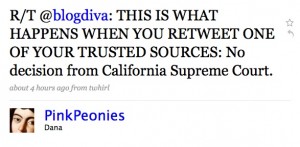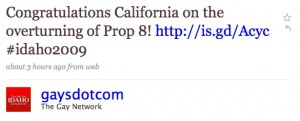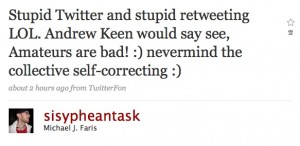Today was an interesting experience on Twitter. Somehow, a whole bunch of people latched onto a few one-year-old newspaper articles about the California Supreme Court ruling in favor of same-sex marriage, and interpreted the articles as news that they had overturned Proposition 8. The “news” spread like wildfire (at least from my perspective).
A few hours ago, I read a few tweets that said that the California Supreme Court had overturned Prop 8, and then I read this tweet1 2:
So I should have known that any subsequent tweets I read about the issue weren’t necessarily true. But I read this:
And followed the link to the LA Times article. I read it pretty carefully, but not carefully enough, obviously. I was confused as to why the article didn’t mention Proposition 8, imagined it must just be a poorly written article, noted the date (May 16, 2008) and thought, well, that’s tomorrow (forgetting it’s 2009 now!) so it must be dated for tomorrow’s paper (I don’t know what went into that reasoning). So I shared the new information on Twitter too. My hopes clouded my reading more than my critical reading skills elucidated my reading. Oops.
Only a few minutes later, though, a friend messaged me and told me the article was a year old, and I immediately posted an oops message and let folks know the article was old, but before people read that, a number of people had retweeted my message. I then tweeted this intentionally ironic post:
The reference is to Andrew Keen’s Cult of the Amateur: How blogs, MySpace, YouTube, and the rest of today’s user-generated media are destroying our economy, our culture, and our values, a polemic that attacks web2.0 technologies for… well, it’s pretty obvious in the title. My point in my tweet was to ironically nod to the book to point out that amateurs communicating online might not always share accurate information, but the Keen’s concern about misinformation in the book is a bit overblown because users online tend to collectively self-correct.3 And self-correct they/we did here.
But then! Ha! I found out via this tweet that the original cause of the spreading misinformation might have been the LA Times itself, with this friendfeed post. (The LA Times blog explains the whole thing here.) The LA Times isn’t to blame for starting the spreading of the fake news, because some posted to other articles, including this Breitbart article, which has a May 15 post and no year affixed to it. But the LA Times’s post certainly helped to feed the situation.
I just found the whole situation fascinating — frustrating too, because it got hopes up — but mostly, I’m interested in the quick dissemination of inaccurate information, but then the quick correction of that information. I don’t have much else to add, really. Daggle.com and Gawker have more about the start of the “hysteria” (Gawker’s word).
1 For those unfamiliar with Twitter: “RT” stands for “retweet,” which essentially means copying someone else’s tweet as your own own post, and giving them credit with their username at the beginning.
2 All images of tweets link to the URL of the tweet itself.
3 Keen’s book is an interesting and engaging, mostly for its polemical style. Unfortunately, I think, it leaves a bit too much uncomplicated (especially authority, authenticity, changing economies, truth). I largely disagree with most of the book, but that’s a different story.
EDIT: Read Jim Brown’s thoughts at the Blogora.




